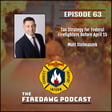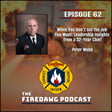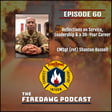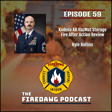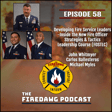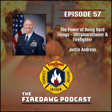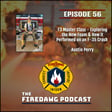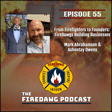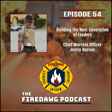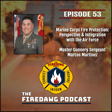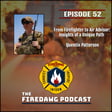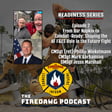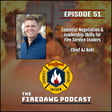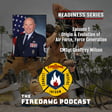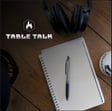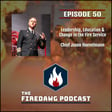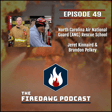Introduction to Table Talk Series
00:00:00
Speaker
This is the Firedog Podcast.
00:00:14
Speaker
Welcome, my name is Matt Wilson, and thank you for listening to the Table Talk series on the FireDog Podcast. The Table Talk series is a free flow discussion on reading, leadership successes, failures, fire service related topics, and much more. It's much like the conversations you have at the kitchen table at your fire station. We have these conversations all the time, and we here at the FireDog Podcast decided to record and share some of them.
Meet Austin Perry
00:00:36
Speaker
Today, I'm joined once again by Austin Perry. Austin is a staff sergeant and a fire officer at the Ileson Air Force Base Fire Department in Alaska. If you didn't catch our last episode together, Table Talk 5, I recommend you go check that one out.
Engine Company Decision-Making Strategies
00:00:48
Speaker
In that episode, we talk about engine company approaches to interior structure firefighting along with some other engine related discussions. In this episode, we once again talk engine tactics, but this time we focus on decision making prior to going interior. Specifically, we talk about breaking down decision making into manageable, easy to remember, and useful approaches.
00:01:08
Speaker
Austin talks about the rule of threes and how to break down decisions such as what hose or appliance to employ on a fire, how to load and stretch that hose, and how to supply the engine into three options each. He also talks about how to break down first and second-due company assignments to again make decision making easy when the alarm sounds. The idea is that when you break down tactics employed on a complicated, time-sensitive, and chaotic situation like a structure fire, it's a simple, easy to remember approaches. It makes your efforts much more effective, and as a result, the outcome much more favorable.
00:01:44
Speaker
Of course, these approaches and ones like them need to be studied and practiced until they become second nature. At no point do Austin or I imply that the information provided is an easy button to engine company operations or structure firefighting. Make sure you do your research and most importantly, train with your crew.
Join Firedog Mentorship on Facebook
00:02:03
Speaker
Additionally, make sure you're doing work in in accordance with your department's procedures. After you've listened to this episode, head over to our Facebook group, Firedog Mentorship, or any of our other social media pages to add your input and to continue the conversation.
00:02:21
Speaker
What's up, Austin? Good to have you back, buddy. We are going to talk about some engine company operations today. before we get into all of that stuff in case some of the listeners haven't heard your previous episode that we did a few ago. Just quick introduction who you are and I guess why you ah why you can talk about this stuff. Okay, um so I'm Staff Sergeant
Austin's Journey in Fire Service
00:02:44
Speaker
Austin Perry. Been in the Air Force for eight years now, ah seven of which was at Shaw Air Force Base. um Most of my time there in Shaw as well, I volunteered with Sumpter Fire Rescue. um And now I'm up here at Ileson.
00:02:58
Speaker
And I guess why I I wouldn't say insert her qualified to teach on this I just this is a like I said like in the last episode I I had a lot of questions so I did a lot of research or had to Seek this knowledge and now that I've got this knowledge from you know subject matter experts around the country or whatever um I Try and get back to the guys and fill in some of the gaps or some of the questions um that they may have from tech school or just guys PCSing from other bases. And then also using that information to mold it to um um my current situation and current ah department and current engines ah just to make everything kind of more systematic approach.
00:03:50
Speaker
Yeah, some criticisms I'll get with this show, and maybe this is just, you know you suffer more in your mind than you do in reality. Maybe these are just criticisms that I'm like dreaming up and that actually haven't came down, but some criticisms like, like who who are who are we in Air Force Fire Protection to talk about any of this stuff? you know we don't get the experience We don't get the experience that municipalities or cities or whoever get, right?
Learning Firefighting Through Training
00:04:12
Speaker
Absolutely. My thought is, it doesn't matter It doesn't matter what department you're in and what your call volume is, you always have the opportunity to learn vicariously through other experiences and to apply that through your day-to-day experiences. and you can You can be a good firefighter, maybe not the best firefighter, but you can be a good firefighter without without
00:04:36
Speaker
a whole lot of experience, practical like firefighting, going into a single family dwelling, fighting a fire, you know a rooming contents fire and rescuing a victim. like You don't have to do that all the time to be a good firefighter. You can learn this stuff and practice it through training and still be good, right? Absolutely. you can I think the main thing is, A, what you just said, drilling, because you can drill for a lack of calls, but you can't make up for a lack of drills on a call. I think that's an Aaron Fields quote. Sounds like it. But the main thing, like you just said, like I have learned so much from other people that do this stuff way more than I ever will. right But I think the main thing is,
00:05:27
Speaker
leading people to good solid information and solid sources of information. um And there's a lot of good guys out there that are putting out information all across the nationally across the fire service. And I think that was one of the things that I got blessed with at a very early point in my career is just having mentors show me where to get good information from. um So like if I don't know if you watch it, but the weekly scrap that Chief Corley Moore puts on, he has literally he has subject matter experts about anything that you could possibly want to learn in this job and has you know two hour plus conversations with them. And then you can go dive down that rabbit hole deeper if you want and go see what they have to say like for themselves. um But that is that podcast is awesome, man, because they
00:06:24
Speaker
They're putting out just great information on everything. Yeah, and I don't want to say that experience isn't important because it certainly is, and it's probably the best teacher, but you you can you can get that experience through training repetitions to a certain extent. Obviously, nothing can be like a real circumstance, but yeah, to to your point, I heard a quote the other day, it's, you don't rise to the occasion, you fall to the level of your training, and you know that's been said several different ways. but And that has to do with, um, like physiological response, which I'll get into. Um, so with talking about decision-making white, so like to you, why do we value decision-making in the fire service?
00:07:12
Speaker
Why do we value decision-making?
Quick Decision-Making in Firefighting
00:07:15
Speaker
Are you talking, I mean, I guess from my perspective as a senior fire officer,
00:07:22
Speaker
When I'm not even necessarily decision, why don't we back? Well, I guess you have to decide to make action, but like, why do we value action? Like, well, that's better than inaction, right? Correct. yeah right you want You want autonomy at that at that level, you want that person to what is what's the be aggressive. You want to be an aggressive decision maker. You want the instinct to be action, I guess is what I'm trying to say. Correct. So the main the main reason, right, are two reasons. We're combating the two enemies of the fire service, which is time and fear. Because fear causes you to be indecisive. Indecisive causes you time, and time costs lives. And when I say we're battling time,
00:08:17
Speaker
We're battling time, not in minutes, but in seconds because things can go very, very south very quickly in seconds, not minutes. You don't have a lot of time. You don't have any time to sit there and think about what you're going to do. So kind of comes back to what you just said. You get hit in the face with something. You're not going to just reinvent the wheel right there. You're going to sink back to the lowest level of training. So. with the fear that is kind of, I think we talked about fear of de-stress. yeah like Everything goes out the window, man.
00:08:54
Speaker
everything. You're not thinking, you're reacting to what's happening. as Sure. So when you say action, you're you're talking about the immediacy like of your decision, like you want a decision right now and you want it to be automatic and something that you don't think about. It's what you get it? Yeah. by decisive flighter Because it's a flight or fight response basically or freeze. So you're either going to sit there and not know what to do, or you're going to do something, or you're going to at least do the lowest level of training that you have, whether that's good or bad. Right. so Gotcha. Yeah. And if there's nothing in your Rolodex. Correct. It's just going to spin. it's You're not going to do anything, or you're going to do something that's not right. Yes. You know? Mm-hmm.
00:09:41
Speaker
so I have just a few questions on this and then we'll get into like kind of. Why are you always grilling me on these, man? um just because i have These are questions I ask everyone. It's not just you. I'm cool with it. I'm just messing with you. ah So what is something that we're all afraid of in the fire service? Failure. that's a good going wrong under our watch unknown we're afraid of sure we don't know because we don't want to look stupid exactly which is why in training you know everyone pushes the new guy up there sure like yeah you know but then you have
00:10:21
Speaker
you know, Mr. Cool Guy sitting in the back. Sure. It's been around for 13 years. Yeah. He acts like he knows what he's doing, but he would look just as dumb as the new guy because he probably hasn't done that since he was a pro beat. Right? So that's why I have some vulnerability as a leader in the fire service. Absolutely. I would say in that, I'm sorry. Dude, it's all good. Say it. No, because it was bad last month. I said it like four at a time. boy 100%, you have to be able to go in front of your, your ah well, A, show them why you're a leader.
00:10:58
Speaker
It's always it's best when the coach shows you why he's the coach. for Sure. Sure. Sure. Don't talk about how much, you know, show me how much, you know, exactly. And I try and make that a very apparent because there is some degree of where like you've got to let the guys get the reps. Right. It's not about you putting or, you know, doing your hands on. um So there is some degree of detachment you have to get. Absolutely. But also it's like, If you don't go throw a ladder and then when the time comes and you look dumb or you're you know sloppy, you're gonna start losing chunks of credibility. So I think that's very important. I always tell guys that like even if you don't know what you're doing, just be the first guy to go up there and you know fail.
00:11:44
Speaker
Like they're all here to train. It's the whole purpose. Think about your perspective as a follower too. If you're not a company officer or let's say you are a company officer, you are a senior fire officer. It's been a minute since you've done those physical tasks. Think about those leaders that you've admired in your past. They're always the ones that are humble and vulnerable, right? They're competent, right? They're smart. They're competent. They're hardworking. But like I think about the people that I admire from my past and they've always had some elements of um
00:12:15
Speaker
vulnerability or they've shown vulnerability, they've admitted when they didn't know something. They admitted if they weren't good at something, right? Like you respect someone so much more when they do that. So to think that, oh, I don't want to go and throw this ladder because I don't want to look like an idiot. I'm going to make the youngest guy like, If you try to throw the ladder and you don't do it well and they see that, and then you come back and say, gents, I need to get my reps in. Let's get them in together. Like how much more are they going to respect you for that? You know what I mean?
Leadership and Vulnerability
00:12:43
Speaker
Un paramount. And also, like I would rather you tell me, I don't know this, or I don't know where this thing is on the truck.
00:12:53
Speaker
So I can tell either A, tell you or have the driver tell you. Sure. Rather than you go to go do it or and act like you know how to and just completely mess it up or you're going on a wild goose chase opening every single compartment to try and find this a piece of equipment. Like that's not the time and place I needed. Sure. Sure. so Listen, you're going to get chewed out too if you don't know stuff. Absolutely. But we've all been chewed out, man. like It's not the end of the world. it's just all right
00:13:26
Speaker
It is, right? It's called failing forward to, like, hey, I made a mistake. It's how you respond to that failure that matters. Like, all right, I'm going to learn these compartments. I'm going to know them well. I'm going to learn this ladder well. I'm going to learn this technique well. It's not even necessarily chewing someone out. It's just holding a standard. Right. And beating in why it's important, especially if it's on a real emergency. It's like, Dude, this isn't the time and place to be faking it till you make it kind of thing. So also with that and decision making and the unknown, i will I guess I would say, what would be your definition of risk? Because obviously when we're making decisions worse, there's always some kind of risk evaluation, right? What would you define as risk?
00:14:22
Speaker
Risk is there's a hierarchy of hazards. At the higher end of that hierarchy are things that can cause death, destruction at the lower end of the hierarchy, injury, damaged equipment. It's a tough thing to define for sure. Absolutely. And that's kind of what I'm about to get at. um So the ISO defines risk as the effect of uncertainty on objects. This definition focuses on how incomplete knowledge of events or circumstances can impact organization's decision making. So with that,
00:15:02
Speaker
Yes, we know what risk is, but what is what's a risk to you versus what a risk to me are going to be two completely different things. Absolutely. Subjective for sure. Based off of our past experiences, training, knowledge, there's a whole other hierarchy of things that can make a risk for me, something completely different than what's a risk to you. So it's a hard thing to get at, right? So it's like, how do you go about that, right? Or especially, um you know, with your company ah level officers of like,
00:15:45
Speaker
If you're in, if you're command, right. And something's not as risky to you, but it might be more risky to someone that you're telling to go into that situation. It's like, how do you, how do you, you know, it's like comparing apples to oranges kind of thing, or on the flip side, you know, maybe you got a gung ho company officer and he's, you know, maybe trying to go making an aggressive, a more aggressive move than you're comfortable with. Um, it's just a weird thing that we have to deal with in our, in our job. Um, so it plays into making, making your decision. Um, so with that, right? How do we combat these things? I kind of already went over is like knowledge really. It's the fear that the antidote to fear is knowledge. So we have to get out there and train and we have to get out there and use our past experiences or use the past experiences of others. Like I said, like we've been talking about learning from these guys that do this stuff way more than we ever will.
00:16:43
Speaker
and gain that knowledge because then it's going to make that situation or that uncertainty or that unknown more of a known. So now you can combat those things. And then last little bit on that. It's like from a chief level officer. So like say like for me, right? How do you know that I'm competent and that a certain subject or, um, let's just say fire attack, right? Like, how do you know for a certain that I, that I am not going to put somebody in a bad way? There's no way with absolute certainty unless I guess the best way is to see you do it correct in the circumstance. The only two ways to build trust in the fire service is through training together or running calls together. ah go After that it's based off assumption.
00:17:39
Speaker
So we kind of have to get out of this, not necessarily maybe at your level, because hopefully you would. Well, you would see obviously like us trading and whatnot, but like more or less like I don't let my guys. Just tell me they know how to do something. Sure. I'm going to watch you do it. So I know right. Or I'm going to make sure you know what this tool is used for and how to use it because I'm not going to get on scene and you don't know how to change the salsa blade like little like minute stuff like that. Right. Sure. Because you're getting people from all walks of life that
00:18:22
Speaker
may or may not know how to do those things or never been taught how to do those things. come out So it's kind of on your on you to train them completely. So we kind of have to get out of this, we'll figure it out when we get there kind of thing, because hope's not a strategy. Like right we need to be so more squared away. e um So with that, right, And we've been talking about action and stuff and, um, kind of brought it up last time, like doing, doing something now is better. You know, whether it's perfect is better than doing something next week. And it's like, you know, how it's drawn up on in the textbook or whatever. Um, so I use that car fire that we just got the other day, um, was, you know, car fire in the dorms. Wasn't anything crazy. Um,
00:19:18
Speaker
We had, we had to, I was actually driving because one of our new civilians just got promoted. So he stole my, stole my thunder, but um now it's all good. I don't mind driving this fun. um But the trash line was on the other, on the other side. So I told the guys, Hey, disconnect it, bring it on the other side. And that way you just have a straight shot. We're not going around the truck or whatever. And so on the other guys from the other truck, he got out and he got, he came off with the water can. He started putting water on the fire with the water can. And I was like, man, that was, that was spot on because like, you know, he only sprayed for 10 seconds, but it gave it, it gave just enough time for us to switch the sides, charge the line and he knocked the fire back with just so nothing got out of control. Right. Sure.
00:20:08
Speaker
and It's that violence of action that does stuff like that, even like the break
Preparation and Readiness
00:20:14
Speaker
fire, right? Like I didn't pull the dry kin line, but I pulled, a ah pool I did something andsur it quickly. And I think that's what we were talking about when we were talking about violence of action last episode. We were. You made a decision and you went with it. And so just what I'm getting at is like, don't view it as you're stealing somebody's job, right? You're just doing what needs to be done and you're doing it now. And I'm going to quote ah Captain Digi's friend from Queer real quick. He's like, some assignments and tasks can't wait for someone to be ready.
00:20:46
Speaker
So like this is all this stuff and all this like the fear to do stuff like that's going to cause you to not put your gloves on, not mask up as quickly. You start forgetting your hood or like all these little things. And then that's just seconds and seconds and seconds. And the next thing you know, it took you two minutes to put your mask on and get your helmet on and put your gloves on and be ready to go inside and actually do what you need to do. sinking to the lowest level the of your training, right? That's why doing the basics is very, very, like it's the probably the most important thing. You need to be good at putting your gear on and you need to be good at forcing doors. Because with that same car fire,
00:21:33
Speaker
Some guys came off ready to go and some guys got to watch guys do stuff because they were still sitting there trying to put their mask on and gloves on and you know, whatever so Doing these small things and like doing violence of action right and being able to do things quickly like you'll get you're gonna get your line stolen from you dude because it's not a It's not that I'm taking your job, but it's gotta be done right now. And I'm not going to sit here and watch you. Like even from a company officer's great perspective, of my dude's taken forever. I'm not going to just not put water on the fire because he can't put his stuff on quick. You know, I'll, I'll start getting a knockdown on it and then I'll hand him the line once he's ready, but something's gotta be done. Sure. So to your point,
00:22:24
Speaker
focus on the training and the details and being ready for that moment so that you can execute violently. Absolutely. And so I actually had one other question and that'll be kind of what you just said. It's like, what what's your most memorable call? Like when you were other, I'd say like operations level, like whether it was your backseat driving or you know, a crew chief, one of those. I got a handful. do well So just go through one of them. like where where what's What's the specific specificity? is like what's the most like I guess maybe like we're... Have you ever had one that like you got into such a... I'm looking for the... Oh, okay. This, okay, yeah. Sorry, I'm looking at referencing my notes. Did you ever get...
00:23:23
Speaker
have one that was significant enough to where you were just doing the things that you needed to do, but you didn't even realize you were doing them. Yeah. Yeah. There's a cardiac arrest I showed up to first as a as the assistant chief or the operations chief, and my crew was probably three to five minutes behind. And yeah, there was ah there was just nothing but action. You know what I mean? like You look back and you don't even remember. It's like a war in time. It's like this crazy like euphoric feeling almost of like
00:23:59
Speaker
like you You're not thinking. I felt like I was already behind the ball when I when i stepped in and saw this this guy on the floor, people sitting around him like, I don't know what to do. I already felt behind the ball, so I felt like I had to just make up time. Absolutely. And it just stacks and sets. So instructed bystander CPR, trauma shears, cut the shirt off. You know what I mean? And it's so fast. It's like, like you just said, it's just like you already you always feel like you're behind the ball. but um When you look back at that call, you probably almost like don't even realize like the steps or like the actual like actions that you were taking because it just, and there's things that I miss too. And that's a, that's a, that's a point to, to these things. I guess that could be.
00:24:46
Speaker
That but could be because I didn't train well enough for that moment. um It could be attributed to the chaotic nature of the moment. I don't know, you could you could play an armchair quarterback with that one. But I think the important thing is that there was violence in action and that you could never have a 100% solution. But if you can get to that 80% solution, Yes. if that's solution I love that, man. I love that saying that I just told somebody about that the other day and I was like, because ultimately, like you just said, you are going to be able to nitpick. It's never going to go perfect. Sure. No matter what. But if you ah that's why I like the 80% solution because you still got the job done and you got it done well.
00:25:35
Speaker
Well, when you start going below that, which can be, you know, there's probably a really a fine line, right? It is definitely. so and And there could be critical things that you don't want to miss that one. Let's say early access to defibrillation. Like if you did everything else perfect, but never attached the AED or never defibrillated, then like not goingnna you're not going to restart. that rhythm so not at all it's never going to work like that's one of those critical things too yes absolutely so my example that I'll have right of like
00:26:12
Speaker
why all these things matter because when the stress hits and can I guess condition black hits is like those things go out the window, right? Or you're almost not in control because it's your like a physiological like response to this amount of stress that's hitting you in the face, right? So that that house fire that we had this winter, I've been, and I've had not to like beat my chest, but I've had a fair amount of fires. I've been lucky. I've been blessed really to have had a decent amount of experience at this point in my career.
00:26:49
Speaker
Now I'm not saying like pull up first do, but, you know, a lot of times we'd go off base or whatever, you know, second, third do, or, you know, still getting to do work, even though we're not necessarily pulling up. Right. So first do is a lot different than second. It's so much different. Right. And so then I'm in this new situation.
The OODA Loop for Decision-Making
00:27:09
Speaker
I'm first do. Get out the the homeowners are in the driveway. This dude is absolutely frantic crying Screaming his animals are inside. They're dead, you know Like just that's amped up. So as soon as that happens, right? I'm like, oh we have something this is a ah real emergency Go around back. There's smoke coming out of the back door. Okay, this is go time, right? And I don't even remember what I said on the radio
00:27:40
Speaker
had zero idea, I'd have to go back and re listen to it. Hopefully it was okay. Hopefully someone knows sometimes knows what to do. wild stuff Exactly. And so then like, I come back around. I remember I told the guys, boy, let's go. And then I don't remember masking up. I don't remember doing any of the small things, right? I know I did it quickly because I was the first one in the house. Um, but this stuff stacks up, right? And not to call my guys out, but like, And to get, or why it's even more important to give your new guys some kind of frame of reference or start doing these full speed drills. I, we were about to go upstairs and make sure, um, like just that's kind of where all the smoke had gone. So I was like, you know, that was my only frame of reference to make, try and locate what was going on. And, um, you know, I turned around and I'm like, yeah all right, y'all ready? And like, they forgot the hose.
00:28:38
Speaker
Like, you know, that they were like that stressed out. Like they had nothing to do. Like they had no clue. Right. And so it was just such a new experience for them. And I was like, they're Oh yeah, I should probably get that. I'm like, yeah, you probably should. So, but that flow state is like.
00:29:01
Speaker
you don't you don't even know what you're doing. So it's like, that's why the OODA loop, which we'll get into, right, is um observe, orientate, decide, act, right? It's the decision making loop that John Boyd made. And within these things, you have your explicit and implicit memory, you know, what that is. Have you read that book at all? No, I've i've heard with different minds talk quite a bit on the OODA loop, though. Yeah, so the oodaloops basically decision. It's a decision making model, I guess more or less. um And we kind of all do it without understanding that we're doing it like human beings just do it naturally. But like kind of when you outline it, you can kind of, I guess more or less hone in on that thing. So like I said, it stands for observe, orientate, decide, act, right? You're observing what's happening. You orientate yourself up to where you are in like in space.
00:29:57
Speaker
And then you just you make a decision based off of those two things and then you act on it, right? So just for a quick example, right? um Like I pull up, I observed that I have smoke coming from the Charlie side. I orientate myself that I'm on the Alpha side. So then I'm going to decide to pull across to the front door and then I act on that. Sure. And then this just this keeps going, right? And this will keep going over and over again until the emergency cyclical. Exactly. Correct. So then I open the front door. I observe that I have maybe bi-directional flow. So now I know that the fire is on my level um and I have, you know,
00:30:40
Speaker
thick black smoke pushing out, I'm going to decide that I need to flow water and then I do so as I go in. um It just, it keeps going and going and going until you put the fire out basically, right? Another good way to look at it is like iterative decision making and using the OODA loop for iterative. If you don't know what to do, for example, let's just say you don't know like, Oh gosh, I don't know what to do. Let's make this iterative decision toward what I think is the right call. You know what I mean? And and you know yeah if you're dropping a line, almost yeah, there you go. Check points. If you're dropping a line, you're you're committing quite a bit though. It's it's tough to you know move lines, especially if they're charged. But you know in the case of ah of a structure fire, like
00:31:24
Speaker
Again, that 80% threshold, like I see smoke coming out the Charlie side, we're on the Alpha side, that's the most accessible to us, that's where our hose is, that's the easiest iterative decision, we're entering through the Alpha side, right? Yeah. you know And then you get in and you know see how, You see how effective that tactic is, right? The conditions. And then if you got to call an audible, then you call an audible. But at least you made that decision. You went through your OODA loop, made a decision. If it turns out to not be the greatest decision, you know like let's make another iterative decision toward what I think is the best option. Yeah. And then like you like you just said, right, you you come in from the front door, you you know combat whatever conditions those are, you maybe knock that back or whatever. OK, now I'm going to. That's my first checkpoint.
00:32:10
Speaker
I restart my loop, okay, I observe that maybe that the fire, I see the fire is coming from the hallway, then I move up to the hallway and then I restart that whole thing, right? um So I like how do you put checkpoints because that's a good way of looking at it because you're basically going from one decision to the next decision based off your loop over and over again. so Yeah, I think sometimes people feel committed, right? Like, I did this, I got to go with it. Yeah, I know. It's important to not let your ego take control or and that note to understand that there's always options. Yeah, and that's why he brings up or multiple people have explained this of like the observe and orientate portion of it because you're observing whether, you know say you're on your second decision, right? You're observing whether that first decision you made
00:33:03
Speaker
is having an effect, right? Like if you're not getting any change in your fire conditions, you either, you know, didn't bring enough water or you're not putting it in the right spot. So maybe you need to change back up and change what you were going to do, right? So that's an important thing to recognize basically is Don't get hooked, like hung up on the, the, the side and act like you have to obviously continue that loop to make sure it's having an effective outcome. Um, because you're not just going to keep doing the same thing over and over again, if nothing's changing. definitely Right. So like, just, you can use the transitional tech. Like if I'm just spraying water into this room and nothing's happening.
00:33:49
Speaker
Probably because I'm not putting water on the actual fuels that are on fire. I'm not going to just sit there and spray water into this window till the house burns down. I got to do something different. yeah You got to be flexible. Correct. Um, so with the implicit and explicit memory, it kind of just, they, with the OODA loop, basically. And this is kind of going to reference like training. Your explicit memory is information you consciously work to remember, like you're you're thinking about it, you're trying to come up um of a decision to make using your OO loop, basically. And then implicit memory is ah information information remembered unconsciously and effectively. So it's like,
00:34:36
Speaker
I've, I've been in this situation before. I already know what to do. I don't have to observe and orientate myself. I basically go right to the side of that. And so the more training you do or the more experience you you have with, you know, whatever subject it is, you're acting on that implicit memory. And that's basically what you're trying to do from with this is you're trying to go from explicit to implicit on more subjects or tasks. Um, and that's when you kind of get in that flow state of like, I don't remember putting my mask and gloves and all that on, but I've done it a thousand times. So that's why doing those small things make up those seconds. So that's really it about the OODA loop, but, um, I don't know if you have anything else on. No, I think that's great, man. That's great points to and implicit explicit. I mean,
00:35:28
Speaker
It really just drives home the importance of creating that muscle memory and getting the details right so that those are things that you don't have to think about or concern yourself with. They become second nature so that you don't have to make iterative decisions. You know what to do. Yeah. You're already doing it, not even thinking about it. It just really drives me into the It sounds silly. that like because it's kind of like a common sense thing and we kind of already do some of these
Structured Approaches in Engine Operations
00:36:00
Speaker
things. Yeah, but it's important to talk about, you know, all over and over again. Right, because when you outline it like that and you kind of like draw the line between the dots, people's kind of like light bulb stuff starts going off. Sure. The psychology of all of this. Absolutely. And so like with the, you know,
00:36:18
Speaker
and I show I love when it happens in real life not and not and I'm not trying to be negative to the guys but I'm like no you know when when the real thing happens right and I it's full-speed air brake hits go They they have that aha moment of like, oh, yeah, it took me ah a minute to get dressed or a minute plus to get dressed. It took me a minute plus to put my gloves on and put my mask on. And it's like they're they're playing catch up because they're trying to chase whoever is already ready. So I I'm big on preaching, coming off the truck, ready to work. um And, you know, and just even small things like
00:37:04
Speaker
mask up drills. um i I mask up with one glove with one glove already on. I'm not good enough to do it with both gloves on yet, but I'm striving to be because you know if I can mask up 10, 15 seconds with my gloves on already, that's our that's one less thing I have to worry about. I leave one off so I can put my hood on because I can't quite... Not that not not there yet, but we're getting there. Um, so back to the back half of this, right? So all this decision making stuff, I know we've been kind of beat it and kind of goes into using this systematic approach of like the engine. Um, it just intertwines with it, I guess is more or less like why we're even talking about this. So this is the back half of the class of I took.
00:37:56
Speaker
airfield rule of threes, which i that's like a ah term, I guess, in the fire service, but it's pretty much just giving yourself for any decision, giving yourself three ah three decisions to make. So based off of whatever you have in front of you, you're more likely to pick one of these three predetermined things rather than try and come up with something on the fly. um So I took that principle and engaged, well, he gives you
00:38:30
Speaker
He gives you like the five main tasks that would happen on an engine company operation. And then I just threw mode of operation because it's a kind of a company level officer ah task that applies to that. And so I basically used that. And then I just went through our engine here at my department and came up with the three, what I, you know, this is not like our department standard or whatever. This is more or less just what I give my guys is my expectation or kind of teach to them. But um just our three best options for whatever these tasks may be. So the six main tasks are going to be what mode of operation to work in, what hose to pull, how to stretch that hose.
00:39:21
Speaker
If you need to get that hose vertical or, and then how to supply or how to get water to that said line and then how to supply your engine. So we'll just go through all those real quick. I'll give you the three, uh, three, I guess options or, um, you know, plays more or less, and then, um, we can kind of get into it. So. Motive operation, right? Like every. Every size up, every emergency, you pick some kind of mode of operation that you're going to work in. and ah The three main ones that I consider for engine companies that are going to be rescue, you have a known rescue, whether that's you know someone's telling you that there's occupants trapped in this specific ah area of the building or you see them.
00:40:12
Speaker
um whether it's, you know, hanging out of a window or balcony or whatever a case may be, but you know that you got a known rescue. Then you have your attack or your offensive, um offensive attack, and then defensive slash exposure. So not that that's reinventing the wheel, but when you kind of put it that way of like, I have to pick one of these three things. It's a lot more easy or it's easier to do that than trying to be like, Oh, I don't really know. It's already set in stone. Kind of, I guess going back to that iterative decision too. It's like, I got three options here for step one, three options. And what is, what is the most, do I have a known rescued? Uh, nah, they don't know, right? That it's unknown. Let's, let's roll with it. Rescue. You know what I mean? Iterative decision. You get in there, you're like,
00:41:11
Speaker
We've searched nothing, okay, like and of course that would take a long time, but yeah but at least you were aggressive in that action and you made that iterative decision, now we can step back and and go to another... So I guess it's important to know that you can... Or yeah, as I said, the hierarchy of things, right? Like, okay, do I see anybody? No. Is anyone out in the front yard telling me, screaming, waving their hands? Okay, no. Yeah, what's the time of day? Are there vehicles in the driveway? like There's a bunch of variables that you can use in making that determination on that first step. Yeah. And so then move to move to the next, right? Is this, you know, is this a room or rooms on fire or is this an entire building on fire? If the room on rooms on fire, okay, we're going offensive. We're going to make an attack. If it's not, then go to the third thing. Okay. It's defensive. Let's try and save whatever exposures we can get, whether that's cars or adjacent buildings. So.
00:42:04
Speaker
The next one is what hose a pool. ah This will be kind of a little bit more ah technical of like giving guys. I just feel like this isn't really ever explained super hardcore. um And it's just good knowledge to have because it kind of solidifies what we should be doing or how we should be doing this. um So for my engine specifically, it's, we have an inch and three quarter pre-connects and then the trash line. And then we have the deuce and a half on the back. And then we have a deck gun. It's pretty much the three ways that water is going to come out of this truck. So.
00:42:46
Speaker
when do I use these tools, right? Or like what situations do I need to use these in, right? So, um Brian Brush, Chief Brian Brush, exponential engine, he explains it of, if a room or rooms is on fire, pull your engine three quarters. If a residential floor or a commercial fire, pull the deuce and a half. And then if it's a building on fire, that gun. And so with that decision, or it's just already, Hardline for you. You don't have to like you just you're reacting to what's happening, right? Okay It's just it's already done for you basically, but it's also based off of science right so the reason that he says that is because
00:43:32
Speaker
An average room on fire produces between 5,000 and 15,000 BTUs per second. And like one gallon of water will absorb 9,000 BTUs per second. So if you have if you have one inch and three-quarter line with a seven-eighths tip on it and you're flowing 161 gallons per minute, that's 2.7 gallons per second, and you're able to absorb 24,000 BTUs. You're going to, you're going to crush that room and contents fire with that. And that's kind of what we're trying to do. You're trying to select the right weapon for the fight that you're going into. Cause you're not kind of, you're not trying to go into a knife fight and in a phone booth, more or less. You want to punch that thing in the mouth. So.
00:44:18
Speaker
With the deuce and a half, you can, uh, with a one inch and eight, or excuse me, an inch and an eighth tip is about 266. That's 41,000 BTUs per second that you can absorb with that much water. So you're just, no one ever kind of teaches you what how to select the weapon for the fight that you're going into. And when it got broke down like that for me, it was just like, that's kinda like even just the room slash floor on fire. Just so much simpler. Okay. Pull the deuce. Okay. Pull the inch and three quarter, or if it's a building on fire, we need to get a, we need to get the five inch hooked up and just start flowing from the deck on. It's that easy. Yeah, man. That's great. Great approach. Scientific and practical and simple. And in these moments where you're in condition black in your mind, like the simpler, the better. Of course, effectiveness is very important, but if we could, if we could keep that principle of simplicity in there.
00:45:17
Speaker
Yeah, and that's kind of like, I think it's just a underutilized, I think the deuce and a half is an underutilized pose, or at least for us, because we just don't really ever think about it unless we're like just going straight defensive. And then we'll be like, all right, maybe we'll do this. But we don't train to it either. So much in our enterprise. We don't really train to it unless you're taking it upon yourself as a crew and crew you know crew proficiency training or whatever our our our burn trainers aren't I mean, they're small right and yeah one room and content is about all that you can do and
00:45:52
Speaker
That's a good point. I never really thought about it like that. but yeah i mean you're never gonna we never For live fire training, we never are in a situation where we need to pull the deuce because it's it's too much. Right. it you That risk profile is too high for training. like I'm not going to light an entire floor on fire. yeah even and if There's some NIST study, or they they took an entire apartment complex and I can't, I think it's NIST, but it could be another organization, but I'm pretty sure it was them. They took an entire abandoned apartment that they kind of, I guess, quote unquote bought. And they, even in that circumstance, I remember going through some of the the findings of that and they were just applying different tactics and seeing what worked well and all these different things, door control. And, but they were, they were lighting a room at a time. Like they weren't lighting this whole day at once. yeah no no They didn't want to lose the whole thing and lose the opportunity to train with it, you know? So because yeah, you can't do that to training.
00:46:48
Speaker
It can get out of hand right like if you don't don't have fire doesn't go out for two reasons you didn't have enough water or you're not put in the right spot. um So like you said i just something that when you outline it like that i think it will it enables people to make that decision better of. maybe the inch and three-quarter is not enough. um and Then we could get into all kinds of things people don't really know have no idea what they're actually really flowing and you know flow meters and the whole- Well, talking about moving a deuce and a half too, that's a whole another episode, right? like It's a whole another, how do you move that stuff through a building and upstairs? On this chart, it has the nozzle reaction for each one and I didn't even bother you going on.
00:47:38
Speaker
ah on that rabbit hole because that's a whole other tangent. But moving on to the next point is going to be how to stretch it. And so for my engine specifically, um which is kind of something that I would maybe like to see changed with not because this is pretty standard. You know, the loads might be slightly different, but like our guys have to learn how to stretch. three different ways, basically. Would I like it to be different where it was more standardized and they only had one way to learn how to stretch? Absolutely. But anyway, so enter three quarters is going to be our triple layer. And then stretching the triple layer is basically I just teach them
00:48:21
Speaker
you have to just start judging distance now um because now you have to see okay do I have the full 66 feet that I need to clear the bed with my 200 foot pre-connect in thirds right um so 66 feet to pull it just straight or am I gonna have to opt to do an alley pull which for people that don't know what an alley pull is is basically pull the ah pull the triple air out a little bit. One guy grabs the loop, goes one way, the other guy grabs a nozzle and goes the other way. Parallel to the truck and it just splits the triple air out in a much shorter distance. So you're not pulling straight out away from the truck, you're pulling in line with the truck.
00:49:10
Speaker
That makes sense. I don't know if I explained that very well. No, that does make sense. it's It's basically when you're geographically limited in the space that you have. Right. It's for tight quarters. You're going parallel with the truck yeah versus perpendicular. Correct. And this is going to be way dependent and you may get to this, it's going to be dependent on your your your first first due area, your jurisdiction correct in general, right? Like we have to contend with some force protection stuff every once in a while and um some some long distances. So it's worth having the option. correct yeah I think I've heard Aaron Fields or someone else talk about having different lengths, different options. Like if we're talking about inch and three quarter, maybe it's not all
00:49:56
Speaker
150 feet or 200 feet, maybe it's 300 feet, right? But yeah it's all dependent on your jurisdiction. Correct. And so then like another thing that I like a reason for having the two ways to pull that line. um We have snow here. Like you're not always going to be able to drag it through the front yard. Like you have a short little tiny driveway and then ah a walkway to the to the house. not probable, unless you park on the completely opposite side of the street, you're probably not going to have enough room to actually stretch that all the way that you need. So just two ways to do things. Yeah. And just for context, for people that may not be used to snow and thinking like, oh, what's the big deal about pushing snow out of the way? Like in February or January, even December, that stuff is rock hard. Yeah. And it's like... You can stand on it rock hard. Yeah. You know what I mean? And if it's a big winter,
00:50:51
Speaker
Yeah, like, you know, five foot tall, potentially four foot tall. And if it's been plowed into a certain area, like you are, when we talk about geographic limitations, like you are much more geographically limited in a winter time scenario. And, you know, it is what it is. You got to contend with it, but it's just a, it's a point worth considering, definitely. So then for our second way, our second hose, it's going to be our Minuteman deuce and a half on the back. So that's a whole no whole another class right for these guys. But it is like they got to know these three stretches, basically, um because it is different. right The Minuteman is a different way to pull a hose. And they got to know how how to do it when when it's used for, basically. um and that And that's a whole, you could literally do a whole episode on just the different ways to stretch a Minuteman.
00:51:48
Speaker
um It's a very versatile hose load. um And then our last stretch is basically going to be, which is pretty, this is a pretty common tactic in the Air Force. I would say whether you do it with deuce and a half or whether you do it with um three inch, it's going to be some kind of an extended attack, basically. utilizing your hotel packs off of an appliance, um whether that is you know a breakaway nozzle or a gated Y, um that's going to be your third way that we would stretch. And those are, like you said, they're going to be for our long stretches, our commercial buildings, um dorms, stuff like that. Yeah, that's great, dude. Great stuff so far.
00:52:32
Speaker
Yeah. So that, you know, just like you got to get those, give these guys your play, playbook, basically. And now they have, they have the playbook for the inch and three quarter, uh, the deuce and a half. And then if we have to make a really, really long stretch. Um, and then the next bullet is going to be, uh, how to get that vertical.
Managing Vertical Hose Operations
00:52:51
Speaker
So I just talked about dorms. Every, uh, every base has dorms or some kind of, uh, you know, multi-story. buildings. So a lot of people can call it what you want or terminology kind of brings back to the whole jargon standpoint of ah first way that I've always gone with is flying the Y, bringing your hotel packs up, having a rope bag.
00:53:20
Speaker
And, you know, dropping the rope back and hoisting that gated Y up or po hoisting the three inch up and hooking the Y up and then going from there. mom You know, bringing within that tactic, right? Like there's, you you can either tie it off with your rope or bring some hose straps and hook it to something. You know, there's a whatever works best for your department based off of whatever equipment you had. I think we we trained on it a couple of weeks ago and we really like the hose straps and then like, you know, maybe hooking it into the stairs. The railing on the stairs, just where just like you said, it just depends on your
00:54:00
Speaker
response district and what, you know, what's going to be there. Another good option is bringing that hose with you up to that second, third story and rolling it over the side so that you don't have to hoist anything. but that's literal Sorry, I stole your... No, it's all good. So, Aerofield calls dropping the deuce, just like you guys said. There you go. I love the name. Yeah, after, uh, I watched, there's actually a whole YouTube video on the rule of threes, if anybody's interested in, does it feel like listening to me poorly explain it, but, um,
00:54:36
Speaker
I made basically Denver packs or a Denver pack, which is a, just a hotel pack of, I think it's three inch, but you could do two and a half or three inch doesn't matter. It's the same size coupling, but to do basically what you just said, you throw that supply, uh, supply line on your back and then you can drop it down. Um, that way you don't have to foist anything. And then. The third way, this is kind of getting like, I don't, you know, this is just another way of conducting business, but you would probably have to hook maybe two hotel packs together, but you can just take your inch and three quarter and they call it shooting the Y and lower that Y down to the ground um and hooking it in like that.
00:55:21
Speaker
So that's really your three ways to get vertical. i'm ki You got to just ah you know train and see what works best for you and your department and where you're going to be responding to. So you're saying fly the Y is when you're hoisting up. Dropping the deuce is when you're dropping that um dropping that two and a half down or whatever that supply i line down. Yeah, the supply is. And then shooting shooting the Y is when you drop that inch into your quarter. Correct. You'll hear, and and there may be some listeners thinking, like what about a platform? What about a ladder? And that's an option, but I heard Nick Martin. I don't know if anybody if you're familiar with Nick Martin. I talked to him ah you know a couple of years ago on the podcast, and I heard him talking about using, a I forgot what they call it, like a flying standpipe or something like that, where you use a platform.
00:56:12
Speaker
Ladder or something similar or you know, maybe you could even use a Quint whatever has a waterway that you can connect into But he he says and this is his opinion of course and you know But he's he's one whom I trust his opinion I think he's a he's a very well-read and experienced guy to avoid that tactic if it if at all possible because you tie your ladder up to that circumstance like the ladder is a very specific tool and And really, priority one is rescue, or firefighter rescue, secondary means of egress, right? And the latter is, it's useful in that you can move it, right? And we've all seen the rescues that float around on social media or on YouTube, right? Most of the time, the latter's being moved to a convenient spot to get that victim or that firefighter out. Yeah, it's mobile. It's mobile, there you go.
00:57:02
Speaker
So try to avoid that for, you know, this is his opinion, try to avoid that as much as possible. It was something when I was at base X, the last place I was at, and I don't want to call them out and they're good people there. And I'm not saying this is a bad thing, but when I first got there, we had this dorm and you know, we would train to the dorm because it's a risk that we, you know, that we thought was important enough to train to all the time, which is a great thing. But like one of the, one of the go-to tactics that these guys always mentioned was, We're going to use the ladder and we're going to do a flying standpipe. That's it. like That's plan A. right in yeah and I'm thinking, like well first of all, getting it into position is going to be a huge pain in the ass because that we had a confined space there with a lot of trees. and and Then second of all, like now that tool is specific to fire attack. like I'm not moving that ladder. right
00:57:52
Speaker
You probably only have one ladder. And you only got one, right? And it's a specialized tool that you want to keep for that specialized purpose. That's my opinion. I would try to i' wait to the last resort for sure. And another thing too is just like, and I actually just, it's kind of weird that you just brought that up because I had just saw that video. somewhere on social media, Nick Martin talking about that same thing. That's where I got it from too. yeah and um he or He calls that a flying standpipe. I've always understood that a flying standpipe is when you do it with the hose and you make it out of your fight from that. so like That's a whole another thing of like why it's important of outlining this playbook. right because
00:58:38
Speaker
even just the language can confuse somebody because they can call something something completely different and they have no idea. So just ah just a weird weird thing that you brought up. We do that a lot with a lot of things and you know it is what it is ah but yeah just making sure like hey i that I always try to, when it comes to things like this, if it's drop the deuce, if it's fly the Y, right like i always I always assume that somebody in the audience doesn't know what the hell that means. yeah and It's been a minute since this guy has heard about it. like let's Let's all talk about it. and It's just like the national response framework or the national incident management system, right? Common terminologies.
00:59:25
Speaker
like Common terminology should apply in incident command because you're going to join with all these different jurisdictions. and Of course, we're talking about large-scale incidents, but one of the principles of the National Response Framework and Incident Management System is using common terminology so that everybody understands it because this is not the time where you want people to make guesses. and and that you don't want to make people feel stupid until they're not going to ask like, Hey, nobody's, I don't want anybody to feel stupid here. This is what drop the deuce means. It means I'm going to walk upstairs and drop my supply line over the railing and we're going to hook into it and supply our hotel packs that way. Absolutely. Yeah. And I'd like, and people get caught up in the names. It's not like,
01:00:03
Speaker
I don't care what you call it, just we all need to be on the same page, right? And like drop drop the deuce or fly the white, that's just a call out for me to make so that someone can do your, knows what to bring and do the actions that I'm talking about. But like you, like we were just talking about, it's got to all be outlined at least between you and your crew of like understanding that. Um, so anyway, a little bit of a tangent right there. It's all good, man. That was good stuff. ah so The next bullet, we've got two more. Next bullet, it's going to be how to supply those lines or how are we going to get water to those lines specifically.
Supplying Water to Engines
01:00:42
Speaker
um so Obviously, straight from the rig, take the pump, pull the lever. It's a pretty common common thing. right um This next one's a little confusing for people because yes, the water's still coming from
01:00:59
Speaker
the truck, but the next point is appliances. And the way I think about this is like, you can charge it, charge that line, but if you don't open the lever to that appliance or that gate valve, you're not going to get water. So that's going to be your second way to supply those lines. And that's going to be obviously like our extended attacks. Um, what we were just talking about, uh, straight from the rigs going to be obviously like your pre-connects and stuff like that. And then your third way of how we're going to supply our lines is from stand pipes. Um, those are really your three options with that. And then last, simple enough yeah. So not don't really need to beat that down or, you know, beat a dead horse on that one. yeah Um, and then the last way to supply, how are we going to supply our engine? And so this is going to be maybe a little bit of a hot take for some, some people, but this is how I.
01:01:52
Speaker
Austin Perry think it's best for us to conduct business. um And the first way is going to be what's called booster backup. I'm not sure if people are familiar with that term. It's from Chief Kurt Eisen, County Fire Tactics. um It's basically utilizing your tank water and, you know, the next arriving tank water to get quick, quick personnel to the fire ground and quick water on the fire. And then kind of worrying about water supply a little bit later into the emergency. So for an example, and maybe not, you're not probably going to do this on a commercial fire or something like that, but for residential.
01:02:36
Speaker
which is kind of what we're talking about. Um, you can so like with, we have two engines here at Allison, you can spray water out of an inch and should three quarter line for seven minutes before you run out of water. I've yet to be on a fire where spraying for seven minutes continuously. Did it make some kind of impact on the fire ground as long as someone was putting it in the right spot? Um, so with that said, and we kind of talked about it earlier, we're kind of task saturated manpower limited with the two engines. So that's kind of why I bring up like the driver and plugmen, they're kind of going to be tasked with water supply. And then the other two guys are going to probably go do other fire ground tasks. Right. So.
01:03:28
Speaker
The second dude's really going to probably give them their water out of their tank and then hopefully have either stretched the line in on their way in or they're close enough where they can handjack it back. and I'm pretty sure that most people you know with a fairly competent and proficient engine crew within seven minutes can establish or find a water supply and make all the connections that they need to. um And within seven minutes, hopefully that the emergency is changing for the better. um And we have a ah solid knockdown with us being set within seven minutes of us being on scene.
01:04:11
Speaker
Yeah, I don't think that's a hot take. I mean, I know some people have their opinions on it, but again, always refer to your department standard operating procedures, right? What is your department telling you to do? What does the chief officer is telling you to do and do that thing? you know don't Don't just kind of go off and do your own thing, but it's a good tactic to employ. And we talked about the last episode is like rescue mode or fast attack mode, or I have a viable rescue and I don't want to waste time. And so we're going to go straight to the house and I got 500 gallons of water to work with, right? Or whatever your engine carries. And there's some If you're in a rural area, it's got like 1000 gallons or 2000 gallons. like I think there's a there's an engine in ah in one of our mutual aid departments that's like 2000 gallons. I think both of them are up there. It's because they're rural areas, right? like They have to respond out to where there's no hydrant system and there's no like this is it, dude. like You handle the problem with 2000 or you're going to have to... like it's it Especially in the wintertime when all the water's frozen over.
01:05:04
Speaker
Where a bulk of my experiences come from, because ah my last department and last volunteer department was very much the exact same way, they ran thousand gallon engines, but um that's where just a bulk of my experience is from. And so I used it on multiple emergencies in it. never really failed us. I think we had maybe one that was way out and it was probably one of my biggest residential fire. I have had this so far in my career, but where we just couldn't get enough water in time, but that's like mobile water supply and like a big scale operation. But for a normal house, I've
01:05:46
Speaker
seen a lot of a lot of house fires put out with not that much water. Right. um and And listen, you got to be as a company if you're listening to this and you're like, I don't know, maybe you're a driver operator, maybe you're a backseat firefighter, like you have to apply these decisions ah in a smart way. like Don't just think because we're saying this like, oh, I never have to catch the hydrant. yeah It's not an excuse because you're lazy and because you don't want to get to hydrant, right? You have to make an informed decision um and be smart about making that decision. like Obviously, if you have the time, if you have the opportunity, and let's say the there's a hydrant right next to the house, like yeah, hook into that sucker, dude. like Of course you want water. like You want water the sooner more water, the better. right like I always want to have a constant supply of water.
01:06:31
Speaker
but you know don't waste time unnecessarily either, especially in those cases where there's a viable rescue. like I'll give you an example of a fire right back at Base X that we went on. It was a duplex. house is in or The fire is in house A, spreading towards house B. right We roll up the wind. It's a wind driven fire too, going towards house B. ah like Are we going to stop and waste our time getting a hydrant? like we decided not to in this circumstance. And and we even went as far as to open up the deck gun, which is going to deplete your tank even further. right But as long as you're accurate with that stream, like based on the circumstance we're in like We got to be accurate, dude, because as soon as I opened the the bail on this debt gun, like the water is going quick. um But, you know, saved House B in doing that. Right. Because just anyways. But had we wasted time, do you know, it could ah have could have taken out. And I think that's a good that's a good point. And I think Jay Barfield says it the best is like, if you pull up and you don't know what to do. Right.
01:07:37
Speaker
do whatever is going to make the biggest impact on the fire ground at that moment, which is a great example of what you just talked about. Like, yes, you're gonna you're going to shoot a lot of water very quickly and you're probably going to catch your tank like, you know, within a minute. um But what did you do? you gave you allowed your You gave yourself enough time to now get your water supply and install that fire from going to the next house. Good impact. That's what needed to happen. Um, so I like, I like that man. That's all also that gun solid or underutilized tool as well for exactly what you just talked about.
01:08:19
Speaker
Yeah, you see videos every once in a while where and know I don't want to be armchair quarterback, but it's an opportunity to learn, right? um Where an engine pulls up to a house fire and fire is showing out of a second-story window and the guys are just worried about getting the hose and entering through the front door and all these things. And I remember this particular video that I'm thinking of, they're like, no, don't spray into the window. because of the risk of steam burn for any potential and trap victims. And that's a whole nother conversation. Yeah. What's that? You know, I think I know what video are you're talking about. But yeah, that's a whole nother conversation. But it's like, man, what an opportunity to so to just smack that thing with the with the debt gun if you have it or put water in the window before you even think about going inside. Right. Like while the guys are masking up or whatever. Because like and like you just said, like stretching the line does take time.
01:09:06
Speaker
Like you have to take time to flake it out, put it, put it, you know, where you want it, wherever you're going to enter through. So like, I think, like you just said, there's tons of good videos of guys pulling up as the engine crew stretching or whatever, the the driver just takes the deck gun, deletes the whole front porch that was on fire and gives that crew time to, you know, do whatever they need to do. And then they go inside and put the rest of it out. man so Yeah, it's a great tool. just doing what you need to do. So and then also to come back to, don't focus in on that, that first tactic that I said, that's just how I conduct business. um You know, because hopefully I know that my second dude is going to come in and give me water. But um the next right, like you just said, like, don't
01:09:58
Speaker
bypass a hydrant just because you should think that you have to pull up and use your 500 gallons like the next the literal next ah Next bullet point or next way to do supply the engine is to forward layman like that's you know bread and butter type type thing So don't think that you can't catch the plug and go in um because it's definitely it's works It's why it's honestly, it's hard to put a number on it, but I would say eight out of 10, nine out of 10 times in in the kind of jurisdictions that we're working in, in our enterprise, you're going to have viable hydrants available and nearby to wherever your problem is.
Hierarchy of Tasks for Companies
01:10:35
Speaker
yeah So I'd say eight or nine times out of 10, man, you are probably catching and doing a forward reverse or having a height right next to you. Yeah. And so like, and like you just said, like, even if you pull past it, like most of the time it's going to be close enough where like,
01:10:49
Speaker
you running that five inch out, like a couple, maybe at most a couple hundred feet. It's not going to do that. It does get challenging at about 300. Yeah, for sure. But like you get what I'm saying, like it's going to be a distance that's... Unless it's ice. Helps like a champ. Yeah, right. And then our third wave, like, and this is probably, this really applies to the airfield a lot, or drop tanks slash mobile water supply, which is why it's probably one of our CDCs or even deployment operations. um But drafting ops and then you've got a drop tank, obviously that's going to be our third way that we'll support our engine. Yeah, it's good that we' we're well versed in that in yeah in the Air Force, definitely.
01:11:37
Speaker
Which is funny because like a lot of times, like we bring up rule firefighting and like, like that's really where you kind of only see that and like the civilian world, but we have molded it to what, like where we, you know, work basically. So that's, we are, like you said, I think we're pretty squared away when it comes to that side. I think so for the most part, definitely. Cause it's mainly from what I've seen pretty much everyone's go to, um, Like, I mean, even at Shaw, like it was like, you were going to stretch all 1500 feet of five inch. And that's just like, if you were going to go for my hydrant, like, it's a lot. It's a lot of five inch.
01:12:23
Speaker
So to wrap this up, right. And um this is kind of just like the last little bit of like hierarchy of decision-making of like, what, where do I go or what do I do to fill in? So I kind of gave you like, five like that's inging up and engine company operations as a whole and three different ways to um you know, mitigate those tasks. And then this is going to be more like maybe company level or company officer level type stuff, but like, ah back, kind of back to the mode of operation. So first do ah your first, like, and this is basically like, okay, if one's happening, then you go to the next, right? You go to number two, and number two is happening. Then I go to number three. So we already talked about it with the mode of operation is going to be rescue slash targeted search. Like we know we have a known victim somewhere, probably going to dedicate our efforts to there.
01:13:17
Speaker
um The next one's going to be attack or offensive, right? We need to go in there and make searchable space so that we can go in there and search. And then three is going to be exposure. I like to use the term exposure because it kind of puts you in a more positive mindset rather than when we say defensive, we're like, ah, it's a lost cause. um So when you think exposure, right? Whether it's just saving someone's car that's in the front yard or protecting, like in your example, protecting the house that's next to it. um do what's gonna impact the fire ground the best. And that's pretty, I mean, that you can't really say it more simpler than that.
01:13:53
Speaker
So the only thing that I'm getting at with this is like second do, right? So like if first do is searching you like you're okay. Let me just go through second dues. One, two, three is going to be search attack water supply, right? So first do is already searching or they have a targeted rescue. Then you need to pick up, you need to fill in the gap. You need to bump down to two and now you're going to be attacked. So you can kind of make that place searchable or you can, you know, knock the fire back so that they can make the rescue. yeah Priorities always search or rescue. I mean, I think that's pretty obvious though. But yeah, but if it's not happening already, then that's your priority now if you're the second in. Right. So and then like, and then third is going to be water supply, right? So that's kind of where we get into that split of the second crew just because here specifically,
01:14:42
Speaker
Like I said before, we're task task saturated, manpower limited until you know we get guys from crash or whatever, or whatever eight hour personnel show up. But like, you know, driver plug-in, you are going to grab water supply and then the other two guys are going to go fill in the gaps. So just based off of what's happening on the fire ground, you have to pay attention and know what's the most important and the next most important and just so on and so forth. And then you just keep bumping down. um instead of kind of just getting there and being like, I don't know what to do, like you you already have it lined out. if something's If the first thing is being done, you go to the second thing and if that's already being done, being done you go to the third thing.
01:15:25
Speaker
Yeah, that's excellent stuff, dude. And I don't know if you've heard that. I don't know why I just thought of this. OSHA put out a ah call for ah just last note back in February and it closed out early May for opinion on they've changed the two into out rule. um Yeah to they've made the requirement I guess a bit more broad in that it doesn't It doesn't hamstring you to have to wait till two ensemble firefighters are sitting there with a charged hose They it's going to allow now for at least you have to have at least four Responders because two and two out doesn't just apply to firefighting right it applies to confined space entries and some other um occupational things but um
01:16:11
Speaker
Anyways, for anybody thinking like, well, what about RIT? And yeah, obviously that's a priority. ah But it looks like OSHA is kind of going a different direction with that, which I see as a good thing. Now we'd have to... And Chris Boykley, another, you know my counterpart on the show here, one of my counterparts on the show here, he's ah he and I want to do an episode on that to kind of go through the details of that OSHA change, but um but it's a good thing. It seems on the surface. And then obviously with what I'm talking about, Right right there with the first three those are like, ah initial you pull up and see type thing like obviously like, there's a lot of other things that have to get coordinated like, you know, ventilation, right you know, all these other there's a lot of support functions that happen but these are like,
01:16:58
Speaker
for air brake sets, what am I doing? Exactly. And again, back to the principle of simplicity, like in these complex circumstances where people's lives and people's property are at risk, like let me make it as simple as possible. And the rule of threes is a great way to do that so that, you know, we can be aggressive in our decision making and be effective. And that's really why I took it and ran with it because I mean, you're going to pick, if there's three things picked out or already picked out or laid out in front of you, you're going to pick, you're going to pick something rather than kind of sit there and like total your thumbs and reinvent the wheel. But yeah, we can complicate things, man. Yeah, it's awesome, man. I appreciate all the all that you've done to i mean to look into this stuff and then to impart it on the rest of us, man. This is great stuff. And the scientific approach with ah the nozzles and the line selection and simplifying things with the rule of threes. and um I know that you didn't make it up necessarily, but I know that you learned vicariously through others and through reading and through watching. and
01:18:03
Speaker
Yeah, that's a good thing. I should say preferences ah are I did in the last episode, but none of this is mine. This is all stuff that I got from people that are way smarter than me, but it's not always common knowledge or people don't necessarily know where to find this stuff. So um just giving back to, you know, our career field and the people that come after you is just what, you know, it's what this job's about and what you're supposed to be doing um as a leader in this career field is educating the people that come after you. Definitely. And then just being ready to be able to execute on your responsibilities, man. And that's another part of it, right? Like, um, don't just think because you did fire officer two or fire officer one or whatever, or driver operator, pumper, driver operator at MWS that you're good to go because you're not in none of us work. You have to expand your knowledge, um, on everything, man, ah every level.
Beyond Basic Requirements
01:18:59
Speaker
Cause there's, you know, you get,
01:19:02
Speaker
Unfortunately, maybe get the bare minimum. um So it's not just because you did your pump or CDC doesn't make you an engineer. Yeah, 100%, man.
Review SOPs and Equipment
01:19:12
Speaker
So action items for some folks out there, listeners, man, if, you know, just to kind of go over what we went over here, you know, look at your SOPs, look at how you do business, look at your truck, look at your hose configurations. How long are they? What are the diameters? What kind of nozzle am I working with here?
Rules of Three for Decision-Making
01:19:28
Speaker
um and, you know, work through some rules of three here, work through, you know, and if you don't have it specified in your SOP and your SOP gives you autonomy to be able to make these kinds of decisions, man, like grab out a napkin and write this stuff out. Like if I get a fire today, you know, rescue attack.
Strategy and Execution
01:19:47
Speaker
defensive or exposure, you know, um which of my three lines, pre-connect or deck gun, or deuce and a half of my take in, how am I gonna get this line up to the second store of a dormitory or hotel? Like, yeah, write all this stuff out, whiteboard it, discuss it with your crews, and, you know, get down to the rule of three, get some basic things, outlines, and make sure you're all on the same page with how to, um you know, terminologies and how you're gonna do it, and then go execute, go practice. and Yeah, man, just so with all that you just said, man, and then you basically just explained to them, make your make your playbook and yeah you just kind of, you know, you just kind of got a hard outline of an easy way to do that. Definitely. All right, Austin, I always appreciate it. And I look forward to the next one. Absolutely, dude. See you later. All right, buddy. Bye. Peace.
Conclusion and Call to Action
01:20:40
Speaker
Thank you for listening to this episode of the fire dog podcast. You can find more episodes just like this on our website, firedog.us, or wherever you listen to podcasts. We're also on social media on Facebook, Instagram, and LinkedIn. We are at the fire dog podcast that is the fire DAWG podcast. Don't forget to subscribe, like, and follow so you can stay plugged into every new episode. Lastly, we'd love it if you share this podcast with your friends and your coworkers, either on social media or within your firehouse. This is Matt Wilson with guest Austin Perry. Until next time, stay safe.

